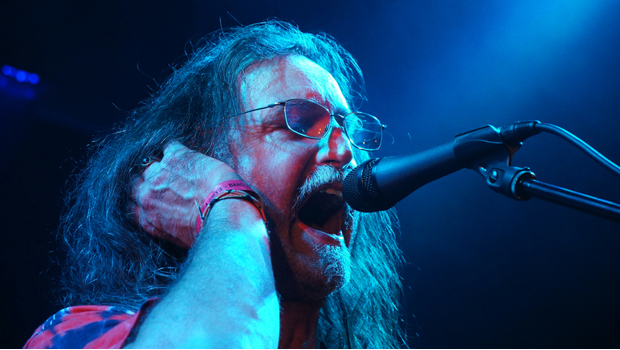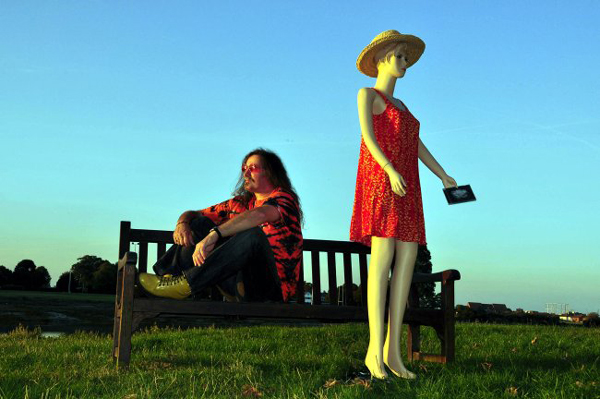Photos: courtesy of Martin Reijman and Sean Filkins.
Tales from the Silent Ocean is the first solo album from ex-Big Big Train drummer, Steve Hughes, released earlier this year on F2 Music. Sean Filkins (ex-Big Big Train singer) also features on the album as lyricist and vocalist. TPA’s Leo Trimming interviewed both Steve and Sean about the album and their musical careers. Part two of the interview features Sean Filkins talking about the album, his involvement with other projects, his time with and departure from Big Big Train, and his feelings about a follow up to his first excellent solo album. (You can read part one of the interview, with Steve Hughes, HERE)
TPA: Sean, Tales from the Silent Ocean is an impressive and diverse album. The music is credited to Steve and much of the lyrics to ourself – how was the song writing completed between you? Which came first: the music or the lyrics?
Sean Filkins: The music came first. Initially, Steve sent me some early demos and asked me if I’d be interested in singing the album. I said of course straight away. He then sent some full length songs through, but there were no lyrics. I called him and asked where they were and he said, “Oh, I forgot to mention that, can you write the lyrics too”. I did laugh. Steve had titles for each track and asked if I could write songs around these titles – not easy. At the end he said “If you can add bits about a manic depressive writer that loses his job, and then commits suicide that would be great”. I hit on this last theme so came up with a complete concept about a writer/war correspondent that learns the ropes and then realises people don’t want to see/hear the truth and that people are being dumbed down and prefer reality TV to what is really happening in the world. All this mixed in with the breakup of his own relationship, his manic depression and how he loses everything in the end.
TPA: The album credits the respective aspects of the album being recorded in different studios so presumably it was rare that you were in the studios at the same time – what were the challenges in working in such a distant manner?
Sean: I did go to Steve’s home studio to record the vocals, but had difficulty hearing what I was doing so said to Steve I would prefer to record at a friend’s studio, Geoff Webb’s Dug Out Studio. Geoff played on my album and we had worked together before live and in the studio, with great results. I sang all the lyrics I had written and sent them to Steve over the internet.
TPA: This album is released on Festival Music – a ‘Progressive Rock’ label, but in many ways it does not fit easily in to the ‘Prog rock’ genre. How would describe this album?
Sean: Oh I don’t know, I class anything from Floyd, to Hawkwind, to YES, to Uriah Heep, to Mike Oldfield, Tangerine Dream, The Ozrics, etc., all as Progressive Rock. What Steve has are long songs, with symphonic parts and non-standard 4×4 timings, pretty Proggy in my opinion. Yes, the dancey bits are different, but I had sequencers on my album, albeit more in the vein of Schulze and Tangerine Dream, but it’s all subjective I suppose.
TPA: The main concept of the album is based around a troubled writer who suffers depression, and how it affects his family. What inspired such a theme for the album?
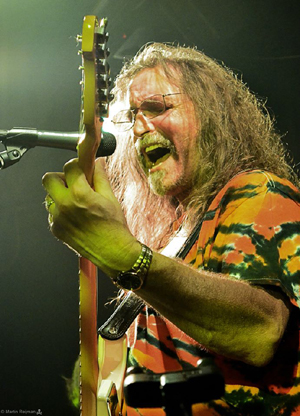 Sean: As I said earlier, there was a line on the end of an email Steve sent me saying “If you can add bits about a manic depressive writer that loses his job and then commits suicide that would be great”. I can’t remember why Steve wrote that, apart from I think there was a program on TV, a documentary about a writer Steve likes, that went through this very subject. I had a couple of song ideas I had written years ago about relationships and breakups. I’ve been through enough of my own to write a soap opera about them, and I’ve seen depression first hand, seen how it can affect you as a person and the people around you, those that care and those that don’t, so I had a good idea of how this writer might be feeling. I then wrote new lyrics for the other songs to coincide with the writer’s life as a war correspondent, his failing marriage, how his work was tearing him and his family apart and finally how he felt that ending it all was the only way out.
Sean: As I said earlier, there was a line on the end of an email Steve sent me saying “If you can add bits about a manic depressive writer that loses his job and then commits suicide that would be great”. I can’t remember why Steve wrote that, apart from I think there was a program on TV, a documentary about a writer Steve likes, that went through this very subject. I had a couple of song ideas I had written years ago about relationships and breakups. I’ve been through enough of my own to write a soap opera about them, and I’ve seen depression first hand, seen how it can affect you as a person and the people around you, those that care and those that don’t, so I had a good idea of how this writer might be feeling. I then wrote new lyrics for the other songs to coincide with the writer’s life as a war correspondent, his failing marriage, how his work was tearing him and his family apart and finally how he felt that ending it all was the only way out.
TPA: This is an interesting album which is difficult to define musically, which makes it fascinating. Are there any artists /bands that significantly influenced your input in to this particular album?
Sean: No. No other artist/band influenced my contribution to this project, apart from Steve giving me the music in the first place to work with of course. I came up with my own ideas for both the melodies and the lyrics.
Over the years I’ve been influenced by other artists, of course. The band YES for one and Hawkwind, both musically. Also the vocals and harmonies of Dan Fogelberg and musical expression by composers like Holst and Vaughan Williams. However, for the lyrics, I just write what I think, what I feel and get from the music, the mood it makes me in – what I get out of it.
TPA: You are credited with the majority of lyrics and ‘vocal arrangements’ on this album – can you explain what that process involves?
Sean: Initially I sang/recorded all the vocals and wrote all the lyrics for Steve. I actually thought I would be singing the whole album, but Steve decided that he wanted it to be more of a solo effort and sang my melodies, adding some of his own with the odd new lyric. Plus he added the girls’ voices to the mix. I had no idea he was going to do that until the album was almost done. It was a bit weird hearing other people singing the melodies I had sung, and initially I felt a bit put out as I’d worked hard on the project. There were one or two phrases that didn’t fit right with me either, different intonation on different words, the emphasis on different words and lines I felt were, well, sometimes missing, the expression wasn’t the same, in my view of course. People who hear the album won’t know this of course, it was just personal to me. But it was Steve’s album and it came out fine in the end. So all is cool as they say.
TPA: Tapestry of Change is a bewildering and haunting musical journey, apparently about the break up in his family, which weaves various strands of music and lyrics together – how was that particularly complex piece put together? Were they fragments of other other songs previously woven together for this song or composed as a single piece?
Sean: For my part, all lyrics and vocal melodies were added on after the music was written. Steve did a fantastic job on Will We Ever Be Free? by mixing lines in and out the way he did. Changing the vocal lines to suit the new pieces of music that were added after I had already sung the song. I love what he did on that. Very unexpected, but it sounds awesome.
TPA: Your first solo album, War and Peace and other Short Stories from 2011, was a truly remarkable début album (one of my very favourite albums from the last 5 years!!). Are there are any plans for a follow up album in the near future?
Sean: I sang and wrote lyrics for Corvus Stone’s last project, and I also sang a track on The D Project’s last album. I did the title track vocals for Jeff Green Project’s Elder Creek album and also sang live with him a couple of times which was just fantastic. I also did a voice over for Minor Giant’s début album and joined them live in Holland where they also played The English Eccentric from War and Peace and other Short Stories which was again a fantastic experience. I have songs written, easily enough to fill a whole new album. I also have guide keyboards recorded and they are ready and waiting in the studio for me to carry on with. I just feel that without the right backing/monies if you wish, I can’t make it the album I would like.
I have had a fair amount of other things, family things that have taken precedent over everything else the last couple of years. I don’t know really, I’m not really sure if I want to do it myself. I don’t feel right about it. I don’t feel good about myself and if I don’t feel right it’s not the right time. I know there are more like you that would like some more material to come out, but I have to feel right to do it right, to do it justice really. I could just release a load of shite and some people would buy it, but that isn’t me at all. It has to be good and it has to be right, better than War and Peace and other Short Stories.
TPA: I really appreciate your open and honest reply on that subject, Sean. Those that love your music will be patient and would not want you to feel any pressure at all. Focus on yourself at present, and the inspiration and feeling for your music will find it’s time and place in your life in due course.
How did you gain interest from David Robinson at the F2 Music label to release such an unusual album?
Sean: I got to meet David through working with Lee Abraham on his Black and White project and after we had met I sent him my album which he released, as you know. I told David at F2 that I was working with Steve on his début album and told Steve that David was interested in hearing it. The ball was then in both their courts so to speak, so that’s how it all got started. David obviously liked it enough and felt that Steve’s album was good enough to put out.
TPA: Sunshine Willow and Willow’s Lament are effectively the climax of this album. I simply have to ask – is the central figure dead at the end of this epic song or is that left open to our imaginations!?
Sean: Well I wrote it that he dies, the light changing green to black before his eyes, as he slowly sinks deeper into the sea looking up at the daylight disappearing before him.
TPA: Can you please tell me about previous artists with whom you have worked. I am interested in what influence they may have had upon you as an artist, and what you felt you brought to them as bands?
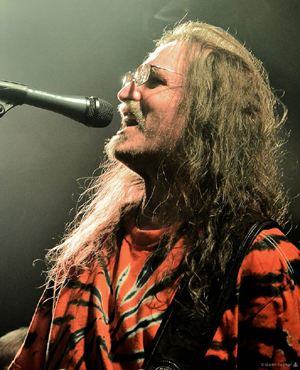 Sean: Blimey, how far do you want to go back! It all started out with Broken Gun, a contemporary folk duo. We wrote a couple of our own songs and did covers by Dan Fogelberg, Simon & Garfunkel, Neil Young, Fairport, etc. – even Hendrix and YES songs. I’ve always loved harmonies, so you could say I was influenced by all the above mentioned bands and artists. I always loved rounds when sung at school so when I first heard YES I was hooked. I sang in a rock band called Vigilante, a cross between Iron Maiden and Thin Lizzy. I was in a cosmic rock band called Soma – a cross between Hawkwind and YES. Then I was in Lorien – a Marillion-esqe Prog Rock band. I’ve also sang in a Whitesnake Tribute band and, of course, Big Big Train. I wouldn’t say any of the bands I’ve sung in have influenced the way I’ve sung or written lyrics for that matter. I just do what I do or did what I did at the time and if they liked it I was part of the band and if they didn’t or if I’d had enough, I wasn’t.
Sean: Blimey, how far do you want to go back! It all started out with Broken Gun, a contemporary folk duo. We wrote a couple of our own songs and did covers by Dan Fogelberg, Simon & Garfunkel, Neil Young, Fairport, etc. – even Hendrix and YES songs. I’ve always loved harmonies, so you could say I was influenced by all the above mentioned bands and artists. I always loved rounds when sung at school so when I first heard YES I was hooked. I sang in a rock band called Vigilante, a cross between Iron Maiden and Thin Lizzy. I was in a cosmic rock band called Soma – a cross between Hawkwind and YES. Then I was in Lorien – a Marillion-esqe Prog Rock band. I’ve also sang in a Whitesnake Tribute band and, of course, Big Big Train. I wouldn’t say any of the bands I’ve sung in have influenced the way I’ve sung or written lyrics for that matter. I just do what I do or did what I did at the time and if they liked it I was part of the band and if they didn’t or if I’d had enough, I wasn’t.
TPA: I would be interested to hear a little more about Lorien. Are there any other plans to collaborate / play with Minor Giant or the Jeff Green Project again or any other artists?
Sean: Lorien originally consisted of just Darren Newitt and Mark McLeod. They advertised in Melody Maker for a vocalist, sent me a demo of Children’s Games which I loved, and I rang them and told them they had found their vocalist. I bought in my old Soma drummer, Phil Legend, and he bought in and old band mate, Geoff Curtis, to play bass. We learnt the album, recorded it, did one tour and then I left. I was in a rather depressed state at the time and needed to sort my life out before I went completely mad. They wanted to do another tour and more gigs, but I just needed to get my life in order. I’d just moved, just got a new job, girlfriend, shared house, etc., and that was more of a priority over the music at the time. Darren, as you know, played two stunning solo’s for me on War and Peace and other Short Stories and we are still friends after all these years.
There are no plans at the moment to play with Minor Giant or The Jeff Green Project, but I’d never say never. I had great times working with all the artists you have mentioned, and you can add The Lee Abraham Band to the list. I know Minor Giant are writing a new album and it would be great to maybe do some singing for them, even if it was just some backing vocals. I loved doing the live gigs with Jeff Green as well, especially the Cambridge Rock Festival gig, and the Winters End Festival with Lee Abraham a few years back now. Those gigs and playing The English Eccentric with Minor Giant in Holland have been really big highlights for me. Special nights, and I can’t thank all the members of the bands enough for allowing me to participate in their gigs. Not forgetting my own gigs, of course, with some really very special people. They know who they are. :O)
TPA: You played previously with Big Big Train on albums – what are your views on what you achieved with Big Big Train, and are there lasting influences on this album? Additionally, what were the circumstances around your departure from Big Big Train, and what are your feelings about the success of this band in recent years?
Sean: I enjoyed what I did with Big Big Train. I felt at the time I helped them to get onto a different level to where they were at, not singularly of course, but as a band, as part of the band. I feel Steve and I were let down by Big Big Train. More so at the time, but then again without getting the push, I wouldn’t then have gone on to do my own solo album, which I love to bits so it all turned out fine in the end. I spoke with Greg recently and it was cool to meet up and chat. I wish them well with what they do and by all accounts their live shows went well, so all good.
As far as influencing me, to be honest, they didn’t. I just did what I did for them the best way that I could at the time. I sang on the two albums, added my vocals and harmonies to the mix, sound effects where I thought they were needed, especially on Gathering Speed. I gave ideas where and when I felt they were needed. I helped them get airplay, and internet interest from fans, radio and reviewers. In being part of BBT at that period I helped them as part of the “BBT collective” to move up to the next level to where they had been previously. I met Dave Meros of Spock’s Beard through Big Big Train so it was fantastic to be able to ask him to play on my album. Also subsequently Lee Abraham contacted me after the split to sing on his Black and White album, which then led to Lee producing my album with me, so it all worked out really well in the end. It also meant that Stevie knew I’d be able to do this project for him.
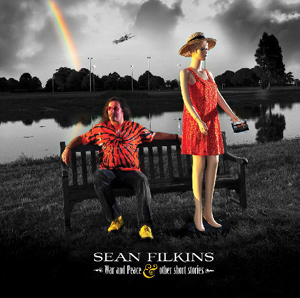 Thank you Leo for allowing me to add to this interview. I would like to pass on my heartfelt thanks to all my fans and those who have supported me over the years, reviewers, writers, DJ’s, musicians. Friends I have met through music. You know who you are. And would just like to ask you to pass on my apologies for not being able at present to offer a follow up to War and Peace and other Short Stories. All the best, Sean.
Thank you Leo for allowing me to add to this interview. I would like to pass on my heartfelt thanks to all my fans and those who have supported me over the years, reviewers, writers, DJ’s, musicians. Friends I have met through music. You know who you are. And would just like to ask you to pass on my apologies for not being able at present to offer a follow up to War and Peace and other Short Stories. All the best, Sean.
TPA would like to thanks Sean for taking the time to speak us
[Leo has also reviewed Tales From The Silent Ocean, which you can read HERE, and interviewed Steve Hughes regarding the album and other aspects of his career. You can read the interview with Steve HERE.]
LINKS
Sean Filkins – Facebook

